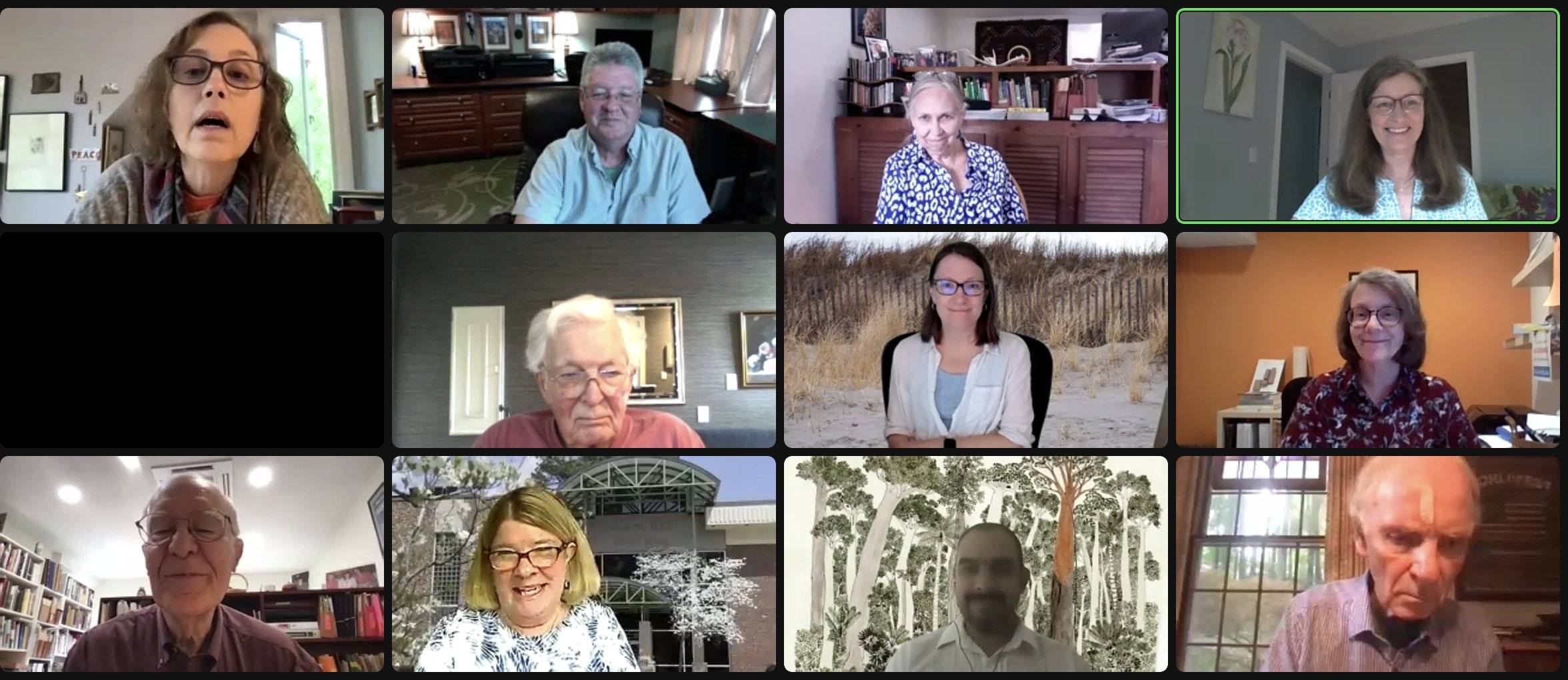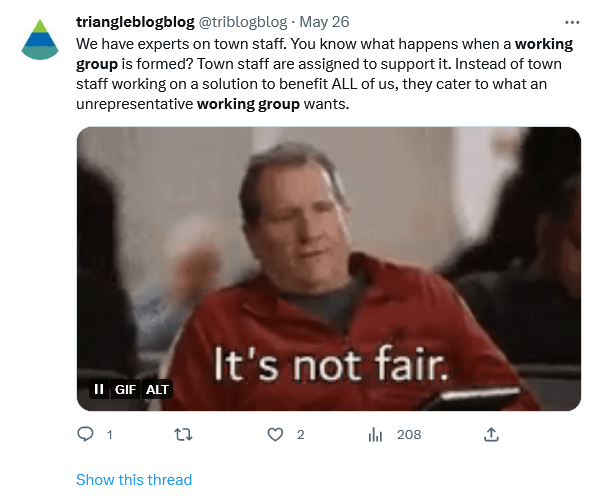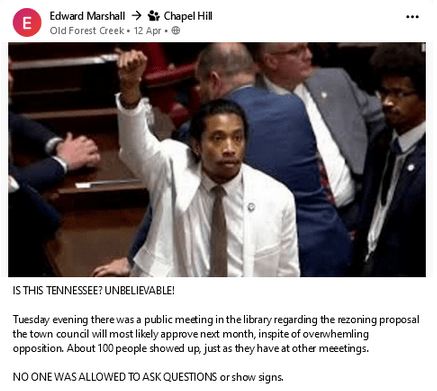Last month, the Booker Creek Working Group held its 13th and final meeting after two years of study. The group, made up of primarily retired homeowners, were given staff support and resources to solve Chapel Hill’s ongoing flooding issues. They were charged with detailing the extent of flooding in Chapel Hill and identifying potential solutions to the problem.
The working group admitted at their final meeting that their recommendations would not actually solve flooding in Chapel Hill. Instead, their recommendations would mitigate flood damages, primarily for homeowners like themselves.

The recommendations issued by the working group mention the term owners 20+ times. Renters — half of Chapel Hill’s population — are not mentioned. Tenants are not mentioned. The areas of the town most susceptible to flooding — the low-lying areas containing Camelot Village, the Brookwood Condominiums, and the South Estes Drive public housing complex — are not mentioned. Apartments are mentioned once.
Indeed, the recommendations made by the working group heavily favor individual and voluntary responses rather than collective action, prioritize homeowners over renters, state cost-effectiveness should be a priority (which will hurt low-income renters), and establish additional processes that may stall or limit the development of multi-family housing in Chapel Hill.
During public comments at the final working group meeting, Edward Marshall commended the group. Marshall, who has created several ad-hoc citizens groups and petitions, said that Chapel Hill needs even more working groups to “evaluate what staff has been doing.” In an earlier meeting, Marshall commented that “it’s time for us to get control of our town back.”
This struck us for several reasons:
- The Booker Creek Working Group was not set up to evaluate town staff, but to control flooding in Chapel Hill.
- We have a competent and professional town staff. Their professional expertise is routinely dismissed by town residents.
- Edward Marshall has repeatedly and loudly suggested elected officials in Chapel Hill are illegitimate and not fairly elected.
Whose expertise do we trust?
In May 2023, shortly after the Booker Creek final meeting, Marshall called for yet another working group — this time around low income housing.
First, a word about working groups.
Working groups and citizen task forces sound sensible. But in Chapel Hill, they are often used as political weapons to stall and delay and accomplish nothing. They give the illusion of citizen input but are often structured to benefit people trying to block or stall council decisions.
We have trusted experts on town staff. When a working group is formed, town staff are assigned to support it. Instead of town staff working on a solution to benefit all of us, they cater to what an unrepresentative (and unelected) working group wants.

Marshall’s new working group proposal is designed to block the housing choices amendment, which would allow duplexes across Chapel Hill — a necessary and long-overdue tool in a larger toolkit to provide housing for more types of people in our community.
His proposal is ignorant of the work of the existing Orange County Affordable Housing Coalition, the town’s affordable housing department, the Housing Advisory Board (which already exists, is made up of representative town residents, and is exactly what Marshall appears to be calling for) and a large body of research that the town routinely receives with recommendations about housing.
Instead of bringing in experts who work in housing, study housing, and work in our town on housing, Marshall calls for a group of [sic] “African-Americans, Latinos, Caucasians, Asian-Americans, Native Americans, students, and older residents” to “evaluate best practices and the research on creating low income housing in a wealthy community.”
Marshall has based his professional career around the ideas of collaborative leadership and trust. In the context of business, that might mean listening to lots of stakeholders and trusting staff and experts to do their jobs well.
In the context of Chapel Hill, however, Marshall makes it clear that he doesn’t trust expertise unless people agree with him. Marshall doesn’t like the housing choices proposal, so he wants to throw it out and set up a separate group that he expects will reach a result he likes.
Harmful and offensive rhetoric
The harmful and factually inaccurate rhetoric Marshall routinely uses to oppose various projects before Chapel Hill Town Council are worth a closer look.
We’ve previously written about Marshall’s stunningly offensive comparison of the Supreme Court’s decision overturning Roe v. Wade to Chapel Hill Town Council’s vote (after a decade of study) to explore the feasibility and safety of remediating coal ash buried near the police station to build a municipal services center on the site. As both Council and we have pointed out, the issue is fraught and complicated — and Town Council does not plan to move forward on any decisions regarding land use until the potential harms on the site can be addressed. They have repeatedly stated this.
Relentless attacks on democratic norms
More recently, Marshall has ramped up rhetoric that implies that our local elected officials were not fairly elected. Living in North Carolina, we are well aware of how fragile democracy is and how gerrymandered our state legislature is. Living in America, it is impossible to ignore the relentless attacks on democratic norms.
These are very real threats. A Chapel Hill Town Council that doesn’t vote the way Edward Marshall thinks they should, by contrast, is not.
In a recent public comment made at a Council meeting about the Housing Choices proposal (which was then repeated in an email to Council, on NextDoor, on neighborhood listservs, and in a petition) Marshall called the Council a “faux democracy” and said that there is an 8-1 ‘supermajority’ on Council.
Let’s be clear: All of Chapel Hill’s Town Council members have been democratically elected. They are the people who received the most support from thousands of voters in Chapel Hill. They each represent the entire town, not certain neighborhoods or residents they deem to be their constituents. And they often disagree with each other, and strongly, as anyone who watches Council deliberations on topics like parks and housing developments and the town’s budget can see.
Why is this deeply offensive?
Republicans at the state level in North Carolina have a supermajority, which means they can now override Roy Cooper (D)’s vetoes. This is devastating news in our state, for democracy, for reproductive justice, for education, for UNC, for LGBTQ individuals, and for our children.
Comparing that to the possibility that Chapel Hill’s Town Council will approve duplexes — already a watered down proposal from earlier in the year — is horribly offensive and inappropriate.
Indeed, it is a tactic that Marshall has repeatedly used in recent months on his emails and social media posts that reach hundreds of people across Chapel Hill. In April, Marshall compared not being able to make a public comment at a council work session (which does not allow public comments) to the Black Tennessee lawmakers who were expelled from the state legislative body after calling for more gun control following Nashville’s deadly shooting.
“IS THIS TENNESSEE? UNBELIEVABLE” he wrote on NextDoor. “…NO ONE WAS ALLOWED TO ASK QUESTIONS or show signs. What is God’s name has happened to our town where public opinion is muzzled?”

There is, of course, nothing remotely similar between two Black lawmakers being expelled from the legislature, under the pretense of “violating the decorum of the chamber,” for advocating for gun safety laws, and a white man being asked to follow the regular rules of a Council work section. But Marshall seems blind to how deeply offensive this comparison is — or maybe he just doesn’t care.
From public comments to private correspondence
In recent weeks, Marshall has bcc’ed hundreds of Chapel Hill residents on emails that contain misinformation about the housing proposal. (Thank you to the many, many people who forward these to us!) He contradicts what the planning staff have said, what Town Council has said, and what research (and evidence) across the country has shown.
Because this news travels by neighborhood listserv, it’s often hard to see, let alone fact-check. But his emails are — like his NextDoor posts — rife with inaccuracies and misinformation. He talks of “losing control of our town” and “division, fear, and incivility” and “distrust” that has developed.
It’s clear that he sees the Booker Creek Working Group as a model:
- Create a panic at the 11th hour around something that people with subject matter expertise have already weighed in on.
- Use the panic to collect email addresses and gin up outrage. Call for a working group of town residents (predominantly homeowners) to solve the problem.
- Have the working group meet for two years or through an election cycle. Stall the decision. Accomplish nothing, and say mission accomplished.
- Move onto the next panic, the next working group, the next batch of emails.
In the latest batch of emails, people who disagree with Marshall are labeled undemocratic, “faux democratic,” or (in our case) the “Fox News” of Chapel Hill.
This is somewhat ironic. Many of the rhetorical techniques Marshall uses have been perfected by Fox News — the highly emotional appeals, the us vs. them rhetoric, and the rampant use of misinformation. Fox uses it because it works.
There has been much written about the rhetorical techniques Fox uses, and how harmful it is to our democracy. Fear-based rhetorical techniques are effective — that’s why we see them used locally and nationally — and they do drum up outrage, fear, and mistrust. But relying on the rhetorical techniques of Fox to divide Chapel Hill is also deeply harmful, and we fear what it portends for the future.
